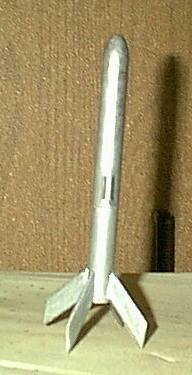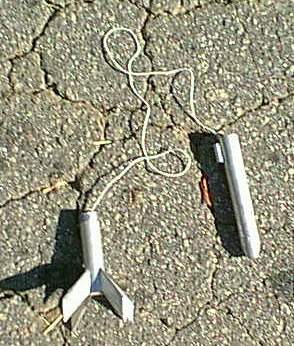| Manufacturer: | Estes  |
 Brief:
Brief:
The Super Flea was a single stage mini-motored rocket that came in a 2 rocket kit along with the Javelin. Estes sold these in the early 1970s, and it was the first kit I ever purchased with my own money. There was nothing really special about them, but it has a sentimental value for me, as I built the original with the help of my grandmother, who is no longer with us. So, I kind of built it as a tribute of sorts.
Construction:
I used a couple small pieces of 13mm body tube, a nose cone from a Rogue Gnat (not exactly a true replica, but close enough), and a 5mm length of low power launch lug. For a tubing coupler, I used a small slice of a 25 year old A3-4T I found in my dad's closet, where I found a lot of other rocket goodies as well. The shock cord is very un-Estes like; I made it out of a 3 foot section of elastic thread, whereas the original was the old flat elastic that Estes was pretty stingy with. The four fins were cut from 1/8" balsa.
The instructions were typical early to mid 70s Estes quality. The illustrations were great, which helped me get the proper scale for the fins and body tube lengths. The only thing I didn't like about the original kit was the shock cord mounting method: the shock cord was wrapped around the tube coupler, then the coupler was inserted into the lower body tube. This caused the tube to distort somewhat, and though it never had any effect on flight it always bugged me. So, for this model I cut a notch in the coupler and applied CA to hold it inside, giving me a perfectly round tube. I coated the fins and nose with a thin coat of 2 hour epoxy for durability, then painted the whole thing with testor's Aluminum. The best part about it was the fact that I had almost all the parts I needed in my range box, except for the nose cone. So I bought a fistful of Gnats from Lawn Dart Rocketry at LDRS and used one of those.
Finishing:
The rockets always looked kind of plain, since they came with no decals. After I epoxied everything, I sanded it all down, applied a coat of day-glo orange, and the thing looked stupid. So I repainted it with Testor's aluminum, and it looks fairly good now. Nothing difficult about this rocket, or the original kit either. Way better than the junk Estes puts out now- NO PLASTIC! I would give this rocket a 5 if it wasn't for the goofy shock cord mounting.
Construction Rating: 4 out of 5
 Flight:
Flight:
My memory must be cloudy, because I don't remember this being a particularly good performer when I was a kid. I even made a 2 stager when I was 12, and don't remember it flying like this. All I did was insert some cellulose wadding, a prepped A3-4T (friction mount), stuff in the shock cord, and put it on the launcher. The countdown came over the PA system, and when it reached 1, that was the last time anybody saw it until later in the day! The thing left the launcher in a blur, and all I saw to prove that it had flown at all was the smoke. All future flights will be on smaller motors, maybe even some micro-motors. The thing is just too fast otherwise.
Recovery:
Recovery works well, even without a streamer. Not too fast, no drifting, and no damage on landing. I am starting to see some charring around the base of the fins though, but that's easily repairable. This is almost the easiest to prep rocket I've ever had, and thanks to the epoxy, pretty near indestructible.
Flight Rating: 5 out of 5
Summary:
Main pros: Easy to prep, good recovery system with the mid-body separation, and eye-popping flights. Cons: too small to see at apogee, and too fast to watch on a "big" motor. Best of all, the thing cost just over a buck.
Overall Rating: 4 out of 5
 |
 |
Flights
 |
 |